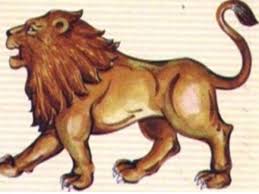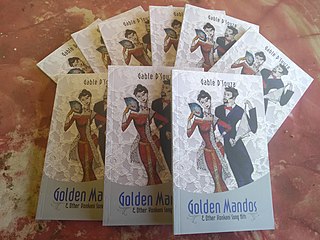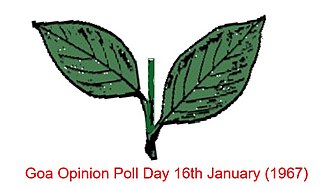Related Research Articles
Gomantak Lok Pox was a political party in the Indian state of Goa. The last general secretary of the party was Mathany Saldanha.

Maharashtrawadi Gomantak Party is a political party in India. It was Goa's first ruling party after the end of Portuguese rule in Goa in 1961. In the first elections held after the Annexation of Goa by India, it ascended to power in December 1963 and stayed in power till being ousted from power by defections in early 1979.

Music of Goa refers to music from the state of Goa, on the west coast of India. A wide variety of music genres are used in Goa ranging from Western art music to Indian classical music. Konkani music is also popular across this tiny state. Being a former territory of Portugal, Goa has a dominant western musical scene with the use of instrument such as the violin, drums, guitar, trumpet and piano. It has also produced a number of prominent musicians and singers for the world of Indian music. Portuguese Fado also has significance in Goa.
The Konkani people are an Indo-Aryan ethnolinguistic group native to the Konkan region of the Indian subcontinent who speak various dialects of the Konkani language. Konkani is the state language of Goa and also spoken by populations in Karnataka, Maharashtra, Damaon & Kerala. Other Konkani speakers are found in Gujarat state. A large percentage of Konkani people are bilingual.
Cuncolim is a town in South Goa district in the state of Goa, India.

Chinchinim is a census town in Goa state, India. It is located in the Salcete taluka of South Goa district. Prior to achieving the current status of a small town, it was considered one of the biggest villages of southern Goa.
Goan Catholics are an ethno-religious community of Indian Christians adhering to the Latin Rite of the Roman Catholic Church from the Goa state, in the southern part of the Konkan region along the west coast of India. They are Konkani people and speak the Konkani language.
Goans is the demonym used to describe the people native to Goa, India, who form an ethno-linguistic group resulting from the assimilation of Indo-Aryan, Dravidian, Indo-Portuguese, and Austro-Asiatic ethnic and/or linguistic ancestries. They speak different dialects of the Konkani language, collectively known as Goan Konkani. "Goanese" is an incorrect term for Goans.

Jack de Sequeira, popularly known as Dr Jack de Sequeira; also known as Jak Siker according to local naming conventions, was an Indian politician and is widely considered in Goa to be the "Father of the Opinion Poll", which led to the former territory attaining statehood in 1987.

The 1967 Goa status referendum popularly known as the Goa Opinion Poll was a referendum held in newly annexed union territory of Goa and Damaon in India, on 16 January 1967, to deal with the Konkani language agitation and to decide the future of Goa.
The United Goans Party is a political party in state of Goa. It was formed in 1963 in the former union territory of Goa, Daman and Diu, with Jack de Sequeira as its party leader, when multiple regional parties merged during the Konkani language agitation.
Captain Alvaro de Loyola Furtado BS WM OM, popularly known as Dr. Alu, was a former member of the Goa, Daman and Diu Legislative Assembly and one of the founding members of the United Goans Party. He was also a social worker, historian, journalist, medical practitioner and humanitarian. Described as a leader among men, a man of great integrity and honour.
The Goa liberation movement was a movement which fought to end Portuguese colonial rule in Goa, Portuguese India. The movement built on the small scale revolts and uprisings of the 19th century, and grew powerful during the period 1940–1961. The movement was conducted both inside and outside Goa, and was characterised by a range of tactics including nonviolent demonstrations, revolutionary methods and diplomatic efforts. However, Portuguese control of its Indian colonies ended only when India invaded and annexed Goa in 1961, causing a mixture of worldwide acclaim and condemnation, and incorporated the territories into the Indian Union.

The indigenous population of the erstwhile Portuguese colony of Goa, Daman and Diu underwent Christianisation following the Portuguese conquest of Goa in 1510, which was followed by the Goa Inquisition from 1560 onwards. The converts in the Velhas Conquistas to Roman Catholicism were then granted full Portuguese citizenship. Almost all present-day Goan Catholics are descendants of these native converts; they constitute the largest Indian Christian community of Goa state and account for 25 percent of the population.

The Christian population of Goa is almost entirely Goan Catholics, whose ancestors converted to Christianity during Portuguese rule. Christianisation followed the Portuguese conquest of Goa in 1510, which was followed by the Goa Inquisition from 1560 onwards. The Hindu population is mostly descended from immigrants from other states of India, who have been arriving in Goa since the last century There is a higher proportion of Christians in Velhas Conquistas than in Novas Conquistas.
Francisco Luís Gomes was a Goan physician, writer, historian, economist, political scientist and MP in the Portuguese parliament. A classical liberal by political orientation, Gomes represented Portuguese India in the Cortes Gerais (parliament) from 1861 to 1869. His outstanding contributions towards the fields of classical liberal philosophy and economics led him to be widely hailed as "The Prince of Intellectuals" in Europe.
José Matanhy de Saldanha was an Indian social activist, journalist, former Member of the Goa Legislative Assembly and school teacher, who campaigned for Goan identity, values, and culture. He also served as a Cabinet Minister in the Government of Goa with portfolios of Tourism as well as Science and Environment.

Goa is a state on the southwestern coast of India within the Konkan region, geographically separated from the Deccan highlands by the Western Ghats. It is bound by the Indian states of Maharashtra to the north, and Karnataka to the east and south, with the Arabian Sea in the west. It is India's smallest state by area and fourth-smallest by population. Goa has the highest GDP per capita among all Indian states, two and a half times as high as the GDP per capita of the country as a whole. The Eleventh Finance Commission of India named Goa the best-placed state because of its infrastructure, and India's National Commission on Population rated it as having the best quality of life in India. It is the second-highest ranking among Indian states in the human development index.
The political parties based in Indian state of Goa
The first elections to the Goa, Daman & Diu Legislative Assembly were held in December 1963, to elect members of the 30 constituencies, in the Union territory of Goa, Daman and Diu, India.
References
- ↑ "The Partido Indiano and the September Revolt of 1890 in Goa". Economic and Political Weekly. 46 (33). 13 August 2011.
- ↑ "Partido Indiano Archives". Oscar de Noronha. Retrieved 2023-07-31.
- ↑ Sakshena, R.N. Sakshena (2003). Goa: Into the Mainstream. Abhinav Publications. ISBN 978-81-7017-005-1 . Retrieved 2009-06-13.